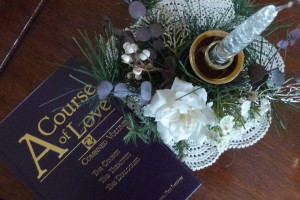
The Christ in you is that which is capable of learning in human form what it means to be a child of God. The Christ in you is that which is capable of bridging the two worlds. This is what is meant by the second coming of Christ. C:P.7
There is only so much I can hold at this time of year, and maybe that’s the beauty of it. My oldest brother, whom I admire greatly, lives alone and says he doesn’t mind Christmas Day, but he minds Christmas season. I’ve often thought that the day will come for me when Christmas is whittled down to a holy day and the rest falls away. And yet this year I’m appreciating the way the season takes me over and takes me out of ordinary time. . . and accepting once again, in a way I come around to each year, that it includes gift giving and wrapping and baking, the occasional stress and sentimental feelings, as well as the peace of the season’s good tidings and the reprieve of simply being out of the “ordinary.” I can appreciate anything that takes me out of ordinary time. Being out of ordinary time is like visiting another state of being. Some would have us believe this only happens in meditation, or formal practices of some kind. But life is full of events that take us out of ordinary time.
In the Catholic Church, Ordinary Time is called “ordinary” because the weeks are numbered. The Latin word ordinalis, which refers to numbers in a series, stems from the Latin word ordo, from which we get the English word order. Thus, Ordinary Time is in fact the ordered life of the Church—the period in which we live our lives neither in feasting (as in the Christmas and Easter seasons) or, as in Advent, in watchfulness and expectation of the Second Coming of Christ.*
It was then, and is now, meaningful to me that in 1998, A Course of Love began as the season of Advent began. . . the season that marks the Second Coming of Christ and the end of Ordinary Time.
How often do we let ourselves take a break from our own version of numbered days, from the ordinary, from “the way things are” for us? How often do we stop working? How often do we give our most stalwart or beloved practices a rest and do something different? Let ourselves be taken up by a season? For many the answer is frequently, for some it is rarely. There are seasons of planting and harvest that gardeners get lost in, letting them take precedence over all else. There are seasons of birthing and dying that take us away into joy or grief and its attendant ritual. There are seasons of illness and fatigue and seasons of vigorous, active good health. There are seasons of creativity, of absorption in art or music. There are even seasons of publishing . . . ha! Seasons where the push is on and we’re all-consumed with fervor over one thing only. I have felt that for a while, and loved it, and yet am feeling a pull toward a season of solitude that I will also honor . . . soon.
These seasons can be allowed or denied. Each of us are so blessed by our distinctness in unity that we do not have to follow in any particular way. Yet to give ourselves over to the seasons of our lives, in moments or weeks or months that “call us away,” is something we must allow and accept if they are going to happen without inner or outer conflict.
“If you do not accept your Self, all of yourself, you cling to suffering.” (D:Day2.26)
It seems to me that each year I stand for days on the edge of this acceptance before I allow myself to fall over the cliff into this acceptance. . . and it is true for other seasons as well. Life is full of pauses and leaps.
A Course of Love calls us to the grandest leap of all, to accepting the second coming of Christ in our own lives.
In the Treatises, the second coming is called the energy that will bridge the two worlds. (T1:6.9) The bridging nature of A Course of Love is perhaps a more heartfelt and human-oriented way of expressing non-duality. We need not see our humanity as false in order to see oneness as true. Like Jesus, we too can be the coming of the Christ, the bridge that unites. What is more non-dual that this reconciling, in us and in the world, of the both/and nature of our being into an inclusive oneness of being! Heaven and Earth are joined, and our humanity and divinity are one in Christ. There is no loss but only gain!
In Day 10 of The Dialogues, Jesus tells us he’s going to be with us in a new way; that he came to us in the form of the consciousness of the man he was because we weren’t ready yet to give up our reliance on an outside source for reliance on ourselves; we weren’t ready to give up Jesus for Christ-consciousness. We have, he says, been unable to see the two as the same, and he concludes in this way:
This sameness of the person you are and Christ-consciousness, of union and presence, of the individual and the universal, is what the elevated Self of form must encompass. D:Day10.19
The non-dualism of ACOL is found in our call to be this new Self. It is found in showing us that there is no distinction between the divine and the human. There is no ultimate distinction between heaven and earth. There is only distinction between truth and illusion . . . until truth reigns in us. It is a both/and theology that calls us to accept ourselves now, and to, through acceptance in union and relationship, be true selves. When Jesus departs from us, first as teacher, and later as the man he once he was, he does so to get us to accept our own ability to live with Christ-consciousness and to embrace the second coming.
Being present as our true selves, we are available to be present to one another and for all the seasons of life and love. This is my wish for you in this holy season. With love~ Mari
*catholicism.about.com


A great piece of writing and thought Mari.
Intention evoked from the beginning of each of our journeys has always included all-that-is…. and this has always pointed to the Greater-Self; the sign and embodiment of the spirit that is the Man; Jesus the Christ which is the love and the living of life. Recognizing, making the realization giving to acknowledgement and being absolute in gratitude where each moment if the moment; moving beyond….
For me; and what I share with others is this sacredness; that in the moment, which is ever-present-ever-flowing; Christ taught moving beyond the need, desire or subconsciousness to name anything as “other”.
This is the true meaning of One-ness.
My “Google-search” of “us as individuals are the second coming of Christ” brought me to your site.
Yes, I so agree with you in many ways and yet I know I am being taught to continue and expand from each of our sacred point of views…. we the Sons of Man are the sign that point to the Second Coming of Christ; we are the sign that is the reflection of the living Christ within each of us..
Thank you and peace.
Thankyou Mari. A lovely bringing together of the human and divine throughout this Blog. Blessings to you, your family and friends this holy season as well.
Thank you Derek. I’m am so glad we share this journey into the new together, especially at the beginning of this new year. I wish you and yours all blessings as we embrace the new.